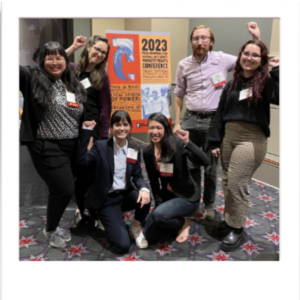Destiny Taylor ’24
 Destiny Taylor ’24
Destiny Taylor ’24
JD Student
Hometown
Miami, Florida
Undergraduate Institution
Florida International University
Undergraduate Major
Psychology
Year of Undergraduate Graduation
2021
Area(s) of Legal Interest
Immigration, Labor, Intersection of Immigration with Criminal Justice System
In terms of support and resources, what do you recommend to prospective students considering Northeastern Law?
I think honest opinions and perspectives from current students are priceless. Nothing compares to hearing about Northeastern Law from the perspective of someone who is currently attending the school.
What extracurricular activities have you been involved with at Northeastern?
- First Generation Law Association, co-chair
- Latin American Law Student Association, 1L rep and member
- Student Bar Association, Vice Chair of Elections and Procedures
What is your favorite aspect of Northeastern Law’s co-op program?
Interacting with clients! Client contact while on co-op is an invaluable experience and it is gratifying to know that I’ve helped real clients with their cases.
Destiny’s Journal
Picture this: After many applications and interviews, you finally scored your first public interest co-op, only to find out that the organization cannot afford to compensate you for your work. Unfortunately, this scenario plays out for many students interested in public interest co-ops, but it doesn’t have to be your reality! There are various ways to secure funding for your public interest co-op, including fellowships, scholarships, Federal Work-Study, and Northeastern Law-specific resources, like the Program on Human Rights and the Global Economy (PHRGE) Fellowships and the Cooperative Income Sharing Program (CISP).
Fellowships and Scholarships
This past summer, my co-op at Justice at Work was dually funded by the Peggy Browning Fund and Equal Justice America. The Peggy Browning Fund is a labor law fellowship program that funds students completing labor-related legal internships. The fellowship is interest-area specific, but you apply to specific organizations or law firms throughout the process. Equal Justice America sponsors fellowships for law students who are working in legal civil aid. Unlike Peggy Browning, Equal Justice America is not interest-area specific and does not only occur in the summer.
You may think, “That’s great, but how do I even find these opportunities?” You can find fellowship and scholarship opportunities through Northeastern Law’s Symplicity system, your network (think friends, professors and mentors!), and even a Google search! I found out about Peggy Browning through a friend who read about the program in an email from the law school that students received but I missed (takeaway: Don’t be like me. Always read your emails closely!).
Also, this may be an unpopular opinion, but I always tell 1Ls and 2Ls to just apply — even if you think the likelihood of receiving the funding is slim. The worst that can happen is the selection committee doesn’t choose you, and you’re in the same position as when you started. The best that can happen is you get your co-op funded!
Funding from Northeastern Law
The co-op office sends out a co-op funding application each semester. Unpaid public interest co-ops may be funded through stipends or Federal Work-Study. Students who are eligible for Work-Study may receive Work-Study funding when they are on co-op. This has been indispensable for me and many of my friends. Receiving Work-Study funding while on co-op in my situation meant a reduction in the amount of loans I took out, which is helpful long term (because loan repayment is very real and scary!).
On average, co-op funding ranges from $5,000 to $7,000, depending on the source of funding and how long your co-op is. Northeastern Law’s financial aid and co-op offices have created a very useful FAQ guide with more information! When you submit the general co-op funding application, you will be considered for both stipends and Northeastern Law-sponsored Work-Study funding. Make sure you apply by the deadline!

PHRGE and CISP
You can also apply for funding from Northeastern Law through the Cooperative Income Sharing Program (CISP) and the Program on Human Rights and the Global Economy (PHRGE). CISP fundraises year-round for students completing public interest co-ops, providing students with stipends. They sell snacks, used textbooks and Northeastern Law merchandise, with all of the proceeds going toward students who complete unpaid public interest co-ops. CISP exclusively run by students, and all of the student employees receive Work-Study funding to make this happen. CISP is truly made by students, for students and is one of my favorite things about Northeastern Law. CISP sends students an application for co-op funding every semester.
Another Northeastern Law-specific funding resource is the PHRGE Fellowship Program. PHRGE awards students a $3,500 co-op stiped (the award may be more if it is eligible to be combined with Federal Work-Study funding). The co-op must be human rights-related, but this is broadly defined. Look out for the PHRGE application on its website!
I have not received PHRGE funding, but I have received CISP stipends. CISP does such incredible work for students both in classes and on co-op and is an invaluable resource. Check them out for all your Northeastern Law merch needs!
If you have any questions about co-op, fellowship funding or anything else, please reach out to us via email at lawstudentambassadors@northeastern.edu. You can indicate that you’d like me to respond to your question in your email, but I’m sure my fellow student ambassadors would be more than willing to answer your questions as well!
Tips for a successful co-op, from a 3L
1. Set up a 1:1 weekly meeting time with your supervisor
Everyone is different, and styles of supervision can vary, too. At my first co-op, I didn’t have a formal weekly time to check in with my co-op supervisor, and that worked well given my supervisor’s preferences. It took me a few weeks to realize that I could just pop into his office whenever I wanted to follow up on work or ask him any questions. For my other two co-ops, my supervisors set up weekly times where we’d review assignments and talk about the past and current week. Everyone is different, but for your first co-op I’d recommend reaching out to your supervisor to schedule a weekly meeting if they don’t do so within the first couple of weeks.
2. Have at least two court-appropriate outfits before co-op starts
You may have a co-op where you’re not expecting to be in court, and that’s great! Plenty of attorneys and legal interns do a majority of their work outside of court. BUT you should still have a couple of options should you have the opportunity to attend a court session or even represent a client as a student attorney. Professional clothing can be expensive, but it doesn’t have to be! Check out local thrift stores and outlet malls. I found most of my blazers at the Goodwill in Jamaica Plain. Looking professional doesn’t have to be expensive.
3. Perfect your work-from-home set up
Hybrid work models are the norm for many (though not all) legal internships. Definitely have this in mind as you apply and set up your work-from-home space in a way that is best for you. This is incredibly specific to each individual person, but I have a few essentials that I know I need. First, a wide desk space is key for me to get my work done. I like to outline whatever I’m writing on paper before I begin typing it out. A wide desk space is essential for me to lay out my outlines and have my computer open at the same time. Second, I need a comfortable desk chair. Sitting in front of a computer for most of the workday can hurt your back and neck. Having a comfortable desk chair is crucial for me. Finally, I like to have a view of the sky as I work. Being from Miami, the sky and sunshine are essentials for me to feel happy. I like them to be in my workspace as much as possible.
4. Do things in the evenings
Take advantage of being on co-op! Instead of evenings filled with homework and reading, you have the opportunity to make your evenings whatever you’d like them to be. On co-op, you’ll likely have no major law school tasks. Take the evenings to do fun things and don’t fall into the trap of wake up, work, dinner and sleep. Use the time to revisit an old hobby you fell out of during 1L year or maybe try something new. The legal profession can be so draining, so it’s important to strike a balance between working and resting.
5. Visit the office at least once before beginning co-op
If you can’t visit the office before your first day of co-op, try to get there extra early on day one. I showed up at 8:50 for one of my co-ops and quickly learned the office culture had everyone arrive from roughly 9:10-9:30. Every office is different. Transit in Boston can be frustrating, so plan out your trip and be prepared for an alternate route just in case there are major delays with the train. (This is a bonus, but if you have the opportunity to interview in-person, I’d highly recommend that! It takes care of you visiting the office before your co-op starts and gives you a general feel for the area and office generally.)
6. Get a notebook
This sounds trivial, but this is something I didn’t realize I needed until day 1 of my co-op. To be fair, this became less relevant after my first co-op, but that was because I wasn’t bringing my laptop with me to the office, so I couldn’t take my notes on my computer in my supervisor’s office. For co-ops 2 and 3 I used my laptop, but still kept my notebook for client meetings and to do lists.
Overall, a lot of co-op is what you make of it! Don’t be afraid to tell your supervisor the tasks you do or don’t prefer and treat every experience like a new opportunity. Best of luck as you venture out onto co-op!